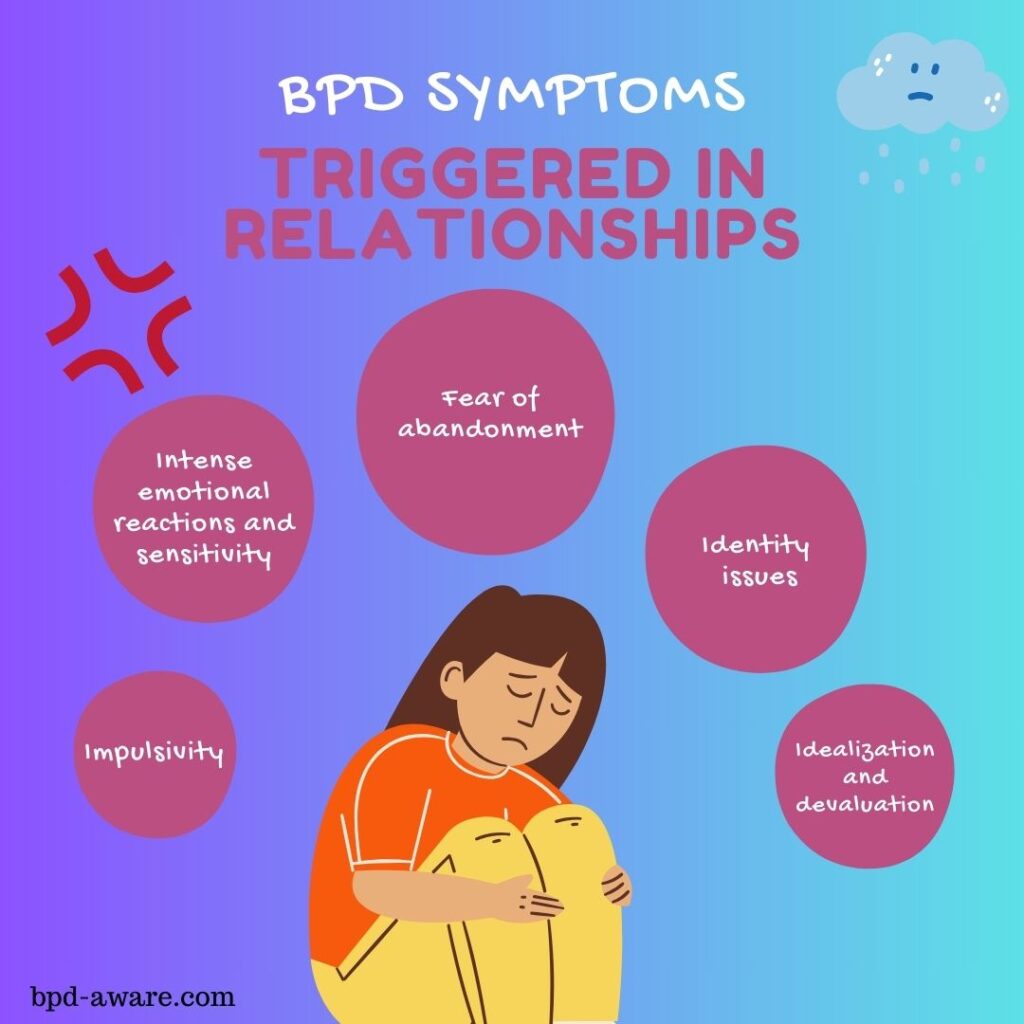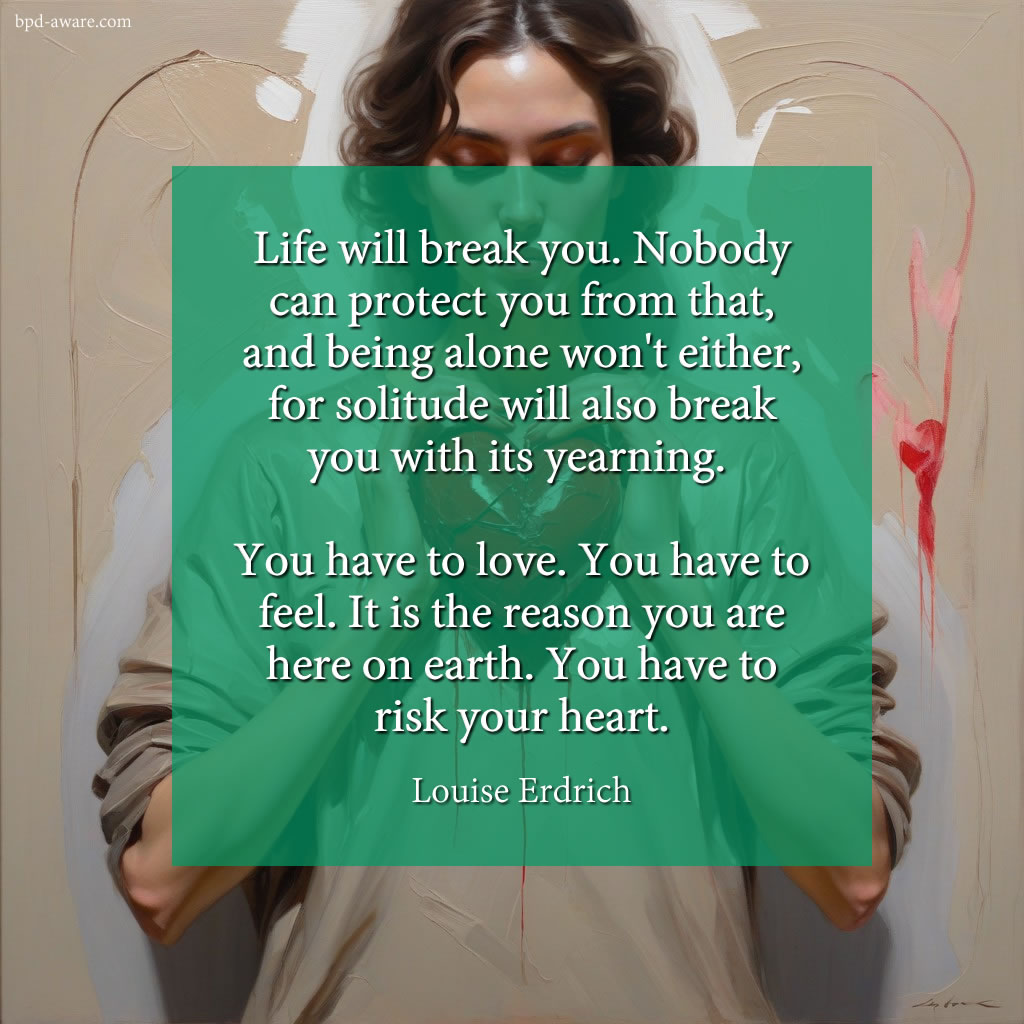Borderline Personality Disorder (BPD) is a mental health condition characterized by patterns of instability in interpersonal relationships, amongst other symptoms such as rapid shifts in mood and unstable self-image. Many people with BPD note that their symptoms become worse when they’re in a romantic relationship or extremely close friendship.
Why might this be? That’s what we’re going to look at in this article.
Fear of Abandonment
One of the major signs of Borderline Personality Disorder is an extreme fear of abandonment – often stemming from maltreatment during childhood. The fear of being rejected or abandoned by a partner can become all-encompassing when in a relationship. Once this fear has been triggered, it leads to intense emotional reactions, which we’ll discuss more later.
But continuing on the theme of abandonment first, when you feel like someone might leave you or reject you at any time it is nigh on impossible to interact with them healthily. You’re likely to become clingy and idealize your partner. When you idealize someone they can do no wrong in your eyes.
Sometimes you might be lucky enough to have found a partner who truly cares about you and wants to do right by you. But other times they might be exhibiting red flags that you’re wilfully ignoring. Even when you’re trying to ignore these red flags, there’s a small part of your mind that’s aware of them and this can trigger other symptoms of your BPD.
Another issue with having abandonment fears is that it can become a self-fulfilling prophecy. Someone with BPD might push a partner away and “test them” to see if their partner “really loves them”. Of course, this maladjusted behavior is likely to cause the breakdown of a relationship and reaffirm the fear of abandonment.
Intense Emotional Reactions and Sensitivity
People with Borderline Personality Disorder feel emotions in a very intense way and they also struggle to manage those emotions. It can make every hour of every day feel like a rollercoaster full of ups, downs, and loop-de-loops; and, just like a rollercoaster, it can leave your head spinning.
In a romantic relationship, particularly early on, your emotions are overwhelming and that’s true even when you don’t have Borderline Personality Disorder. The emotions of someone with BPD are usually running at eleven anyway, so when you factor a relationship into the mix they can truly go off the scale. Every good thing that happens is the best thing that has ever happened…but any slight wobble in the relationship – whether true or merely perceived – can feel like a dagger to the heart. The most minor of conflicts can escalate into significant distress for someone with BPD.
With the typical heightened emotions of someone with BPD doubled, emotional regulation can become next to impossible. Behavior can grow erratic as a result which can lead to genuine problems with the relationship – triggering other symptoms of Borderline Personality Disorder.
Idealization and Devaluation
Idealization and devaluation are common patterns of thinking and behaving in individuals with BPD. It refers to how they think about themselves as well as those around them, particularly people they’re in a relationship with, and is an example of the “black and white” thinking that is a major symptom of Borderline Personality Disorder.
During the idealization phase, you feel fantastic and you believe that your partner is the best thing that’s ever happened to you and that they can do no wrong. You’re seeing them in an excessively positive light and ignoring any red flags they might be displaying. This is common in many people – not just those with BPD – but can be even more intense in those with the disorder.
Then a shift happens and suddenly you devalue your partner. Where once they could do no wrong, now they can do no right. Many people with BPD are aware of this shift or split but there’s nothing they can do to stop it. It’s like watching yourself do something you know is wrong but you’re powerless to do anything about it. This can lead to feelings of guilt and shame which only makes the situation worse.
This rapid cycle of idealization and devaluation causes significant emotional turbulence within the relationship. The non-BPD partner will likely either break things off or lose commitment to the relationship if this behavior continues. Either way, this can cause the BPD partner to spiral and their symptoms to get worse.
Identity Issues
People with BPD tend to have issues surrounding their own identity. They can develop dreams, goals, and hobbies and then subsequently drop or change them at the drop of a hat.
This is particularly true in a relationship where the person with BPD can morph their personality to better suit that of their partners. For example, someone who previously never displayed an interest in running might throw themselves into it if their new partner is an avid runner. Eventually, the person with BPD may lose themselves entirely within the relationship and become a copy of their partner.
This isn’t healthy and causes further identity issues down the line, especially if and when the relationship ends.
Impulsivity
The natural stressors of a relationship coupled with the typical symptoms of BPD can increase the risk of impulsive behavior. Impulsive behavior such as drinking to excess, gambling, and reckless driving are all unhealthy ways of “letting off steam” that can have serious consequences for yourself and those around you.

Should I Avoid Relationships When I Have BPD?
There is a debate within the BPD community about whether people with BPD should avoid relationships or not considering they often exacerbate some of the more serious symptoms of the disorder.
I don’t think that it’s healthy to avoid relationships entirely just because you have Borderline Personality Disorder. However, it does mean that you probably want to be more careful and picky than the average person.
People with BPD, like everyone else, need to love and feel loved – in all its forms. It’s a basic human need. To deny oneself that purely because of a personality disorder can do more harm than good. Shutting yourself away and shutting others out leads to isolation, depression, and other forms of maladjusted behavior. Simply put, it’s not healthy to live life alone all of the time.
As always, we recommend seeking treatment and finding a therapist you feel you can trust. This can take time (and money) but is vital to recovery. A good therapist can help you in your efforts to find a partner who will improve your life rather than make it worse.
Should I Tell My Partner I Have BPD?
Honesty and good communication are the foundational building blocks of any strong relationship. While you might not want to scare someone away, it’s only fair to them (and yourself) that you are open about your disorder and what it might mean for the relationship. If they back away at that point then you’ve just saved yourself time and heartache in the future.
This doesn’t mean that you have to tell someone that you have BPD on your first date but the sooner the better.
If they choose to stay and are supportive of you and your treatment then you might have just found yourself a keeper. You may even wish to involve your partner in your treatment. Your therapist can help you both set healthy boundaries and teach you how to act and react in a well-adapted manner to stressful situations that arise in your relationship.

Final Thoughts
Relationships are difficult at the best of times and one partner (or both) having BPD certainly doesn’t make it any easier. However, that doesn’t mean that relationships should be avoided altogether. With honesty, support from your partner, and whatever form of treatment works best for you – a relationship can be a success.
Remember that there are many forms of relationships. Yours doesn’t necessarily need to look “conventional” to have value to you and your partner. Much like finding the right kind of therapy, it can take time and experimentation.
Self-evaluation is important too. If you don’t believe that you’re ready for a relationship, that’s fine too. Give yourself the space you need until you believe any relationship you enter can be a healthy, happy one.
Sources, Resources, and Further Reading
- All About the Relationship Cycle in Borderline Personality Disorder: https://psychcentral.com/disorders/borderline-personality-relationships-cycle
- 3 Relationship Trials Couples Living With BPD Face—By A Psychologist: https://www.forbes.com/sites/traversmark/2024/11/22/3-relationship-trials-couples-living-with-bpd-face-by-a-psychologist/
- My BPD Gets Worse When I’m In A Relationship: https://www.reddit.com/r/BPD/comments/1800ah6/my_bpd_gets_worse_when_im_in_a_relationship/
















